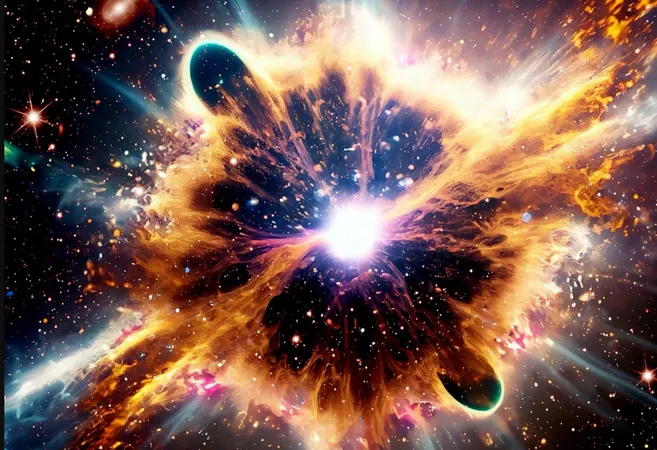
Is This the End? The Universe Might Face a ‘Big Crunch’ in 20 Billion Years!
2025-07-12
Author: Jacques
A Shocking Prediction About the Universe's Fate
For ages, humanity has gazed into the cosmos, pondering both its beginnings and its ultimate fate. Now, a recent study from physicists at Cornell University and Shanghai Jiao Tong University offers a startling timeline for the universe's final act.
Utilizing groundbreaking data from the Dark Energy Survey (DES) and the Dark Energy Spectroscopic Instrument (DESI), researchers suggest that instead of an endless expansion, the universe may be destined to collapse in a catastrophic event referred to as the ‘Big Crunch’.
What is the ‘Big Crunch’? A Cosmic Rewind Awaits!
This colossal reversal is predicted to happen when the universe reaches the ripe age of 33.3 billion years, which means we have approximately 20 billion years left on our cosmic clock. While that’s an eternity on a human scale, it’s still a finite timeframe challenging the long-held belief that the universe will expand indefinitely.
Dark Energy: A Mystery Unraveled?
The study puts a twist on the conventional understanding of dark energy, which makes up about 70% of the universe and is known for accelerating cosmic expansion. Recent observations hint that dark energy might not function as a constant force, as previously assumed.
A breakthrough in this research points to the equation of state of dark energy, denoted as 'w.' If 'w' equals -1, dark energy allows for endless expansion; if it's different, a halt or even reversal of expansion is possible.
The latest data from DES and DESI suggests that dark energy could be more dynamic, leading researchers to propose the axion-dark energy (aDE) model, which combines a lightweight particle called an axion with a negative cosmological constant.
The Future: Expansion, Contraction, and the Final Collapse
According to this research, the universe is expected to grow approximately 69% larger over the next 7 billion years before the expansion ceases. The gravitational forces, alongside the negative cosmological constant, will trigger the universe's contraction, leading everything back to a singular point.
Scientific Verification: A Groundbreaking Timeline Crop!
What sets this study apart is its precise timeline, derived from robust data accumulated across various surveys including the Cosmic Microwave Background (CMB) and observations of supernovae. Researchers have established that dark energy possibly reacts dynamically, hinting at a negative cosmological constant that favors a crunch rather than eternal expansion.
Dr. Zhong-Zhi Xianyu, a co-author of the study, notes the significance of quantitatively determining the universe's lifespan. However, they also acknowledge uncertainties resulting from limited observations and continuously evolving theories.
The Excitement of Discovery and Future Predictions
While this theory is thrilling, scientists caution that it’s still a model. Upcoming missions like the Euclid mission by the European Space Agency and NASA’s Nancy Grace Roman Space Telescope will offer clearer insights into dark energy’s nature.
As more data is collected, this research could refine existing estimates and pave the way for a deeper understanding of the universe’s impending phase.
Reimagining Our Cosmic Perception
Even if the Big Crunch is confirmed, it poses no immediate concern for humanity. In cosmic terms, we are merely in the universe’s early morning. By that time, Earth as we know it may no longer exist.
However, this revelation forces us to confront our cosmic destiny, as definitive timelines transform philosophical musings into scientific inquiry.
As scientists continue to unveil the truths behind dark energy, they edge closer to demystifying our universe. Whether it meets an end in a blaze, freeze, or monumental collapse, the findings today will illuminate tomorrow's discoveries.
In this unprecedented era of research, we might not just wonder about the universe’s conclusion—we could soon know exactly how it all ends.









 Brasil (PT)
Brasil (PT)
 Canada (EN)
Canada (EN)
 Chile (ES)
Chile (ES)
 Česko (CS)
Česko (CS)
 대한민국 (KO)
대한민국 (KO)
 España (ES)
España (ES)
 France (FR)
France (FR)
 Hong Kong (EN)
Hong Kong (EN)
 Italia (IT)
Italia (IT)
 日本 (JA)
日本 (JA)
 Magyarország (HU)
Magyarország (HU)
 Norge (NO)
Norge (NO)
 Polska (PL)
Polska (PL)
 Schweiz (DE)
Schweiz (DE)
 Singapore (EN)
Singapore (EN)
 Sverige (SV)
Sverige (SV)
 Suomi (FI)
Suomi (FI)
 Türkiye (TR)
Türkiye (TR)
 الإمارات العربية المتحدة (AR)
الإمارات العربية المتحدة (AR)